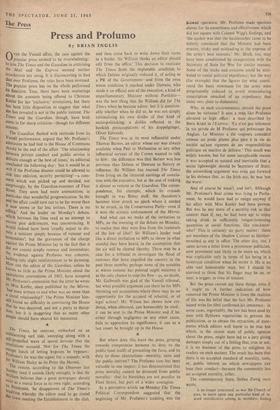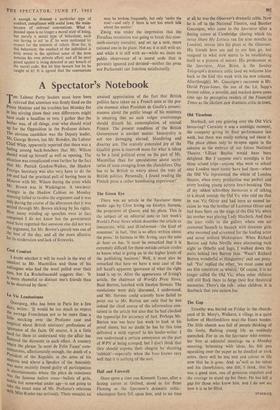The Press
Press and Profumo
By BRIAN INGLIS
vett the Vassall affair, the case against the kJ popular press seemed to be overwhelming: to.join The Times and the Guardian in criticising the Mail and the Express seemed neither treacherous nor smug. It is disconcerting to find that over Profumo, the roles have been reversed. The Popular press has on the whole performed its function. True, there have been mutterings about the amounts being offered to Christine Keeler for her 'exclusive,' revelations, but there has been little disposition to suggest that what she has revealed is not in the public interest. The Times and the Guardian, though, have both come in for sharp criticism—though for different reasons.
The Guardian, flushed with rectitude from its Vassall performance, argued that Mr. Profumo's admission he had lied to the House of Commons should be the end of the affair. 'The relationship between private conduct and public service is delicate enough at the best of times,' its editorial concluded the following day: 'but it would be as well if the Profumo disaster could be allowed to sink into oblivion, security permitting'—a com- ment which was picked up and derided, not surprisingly, by the Guardian-resenters of Fleet Street. They soon had more ammunition; in Particular that wonderful prognostication 'In the end the affair could turn out to be far worse than it now,r, seems or far less serious. There is no telling' And the leader on Monday's debate, which between the lines read as an attempt to excuse past deficiencies, was unconvincing. It Would indeed have been 'cruelly unjust to dis- miss a minister simply because of rumour and innuendoes'; but the gravamen of the charge against the Prime Minister lay in the fact that it did not consist simply rumour and innuendoes; the evidence against Profumo was concrete, lacking only slight reinforcement to be damning. "ow can the editor of the Guardian, unless he knows as little as the Prime Minister about the ePistolaries conventions of 1963, have accepted Mr. Profumo's contention that the letter he wrote to Miss Keeler, since published by the Mirror, had been written to end what was no more than a social relationship?' The Prime Minister him- self found no difficulty in convincing the House t at he was deceived, and not a party to decep- `1°4; but it is staggering that so many other People should have shared his innocence.
The Times, by contrast, embarked on an exhilarating surf ride, sweeping along with a self-Propelled wave of moral fervour that the revelations aroused. Not for The Times the escape hatch of letting bygones be bygones: v.raftiolo's lie was the signal for a crusade, with 'Ir William Haley as its Peter the Hermit. The reason, according to the Observer last Sunda.Y. (and it sounds likely enough), is that Sir believes that a great newspaper should exist as a moral force in its own right; according. ti3 Pendennis, 'he disapproves of The Times's tradition whereby the editor used to go round the town meeting the Establishment in the club, and then come back to write down their views in a leader. Sir William thinks an editor should edit from the office.' This decision to extricate The Times from the deplorable condition to which Delane originally reduced it, of acting as a PR of the Government—and from the even worse condition it reached under Dawson, who made it an official arm of the executive, a kind of unparliamentary Minister without Portfolio— was the best thing that Sir William did for The Times when he became editor; but it is question- able whether when he did so, he was not simply rationalising his own dislike of that kind of socio-politicking; a dislike reflected in the bookish preoccupations of his doppelganger, Oliver Edwards.
The Times was at its most influential under Thomas Barnes, an editor whose ear was always available when Peel or Melbourne or any other influential servant of the Crown wanted to talk to him : the difference was that Barnes was less pervious than Delane or Dawson to flattery or influence. Sir William has rescued The Times from living on the immoral earnings of associa- tion with the executive, but at the cost of making it almost as remote as the Guardian. The corres- pondence, for example, which its crusade brought in was flimsy stuff; the thunderer's hammer blow struck no spark where it needed to be struck, in the Conservative Party—even if it won the ecstatic endorsement of the Mirror.
And what can we make of the invitation to MPs, on the morning of the debate on Monday, to realise that they were free from the trammels of the law of libel? Sir William's leader read like a direct invitation to MPs to throw in what scandal they have heard, in the assumption that the air will be cleared thereby. There may be a case for a tribunal to investigate the flood of rumours that have engulfed the country in the past three months; perhaps some of the notables at whom rumour has pointed might welcome it as the only chance to stop the flow —as, no doubt, Mr. Galbraith was glad of the Vassall tribunal; but what possible argument can there be for MPs throwing out accusations where there may be no opportunity for the accused of rebuttal, or of legal action? Mr. Wilson has shown how evi- dence, when obtained, can honourably be used : it can be sent to the Prime Minister and if he, either through negligence or any other cause, fails to appreciate its significance, it can as a last resort be brought up in the House.
*
But where does this leave the press, groping towards compromise between its duty to the public (and itself) of presenting the facts, and its duty to those abstractions—morality, taste and the public interest? The Profumo case has been valuable in one respect; it has demonstrated that press morality cannot be divorced from public morality: that its blemishes are not peculiar to Fleet Street, but part of a wider contagion.
In a perceptive article on Monday The Times Political Correspondent suggested that the beginning of Mr. Profumo's undoing was the Kuwait operation. Mr. Profumo made specious claims for its smoothness and effectiveness which did not square with Colonel Wigg's findings, and `the upshot was that the backbencher came to be bitterly convinced that the Minister had been evasive, tricky and misleading at the expense of the army's best interests.' Mr. Birch, too, may have been conditioned by exasperation with the Secretary of State for War for similar reasons. Some of the tricks and evasions could be attri- buted to venial political expediency; but the way (for example) that the figures for what consti- tuted the basic minimum for the army were progressively reduced to avoid reintroducing conscription smacked of an expediency that came very close to dishonesty.
Why, in such circumstances, should the press alone be virtuous? It sees a man like Profumo elevated to high office: a man described by Boris Kidel in I'Express: 'Cc n'est pas tellement la vie privee de M Profumo qui preoccupe )ties Anglais. Le Ministre a ete toujours considers comme un poids plume plus apte a la vie de societe qu'aux rigueurs de ses responsibilities politique en matiere de defense.' This much was widely known, but for some inexplicable reason it was accepted as natural and inevitable that a. social lightweight should be Secretary of State; the astonishing argument was even put forward in his defence that, as the Irish say, he was 'not the worst.'
And of course he wasn't, and isn't. Although Mr. Profumo's final crime was lying to Parlia- ment, he would have had to resign anyway if his affair with Miss Keeler had been proven. But was he any more of a security risk in that context than if, say, he had been apt to enjoy taking drink in sufficiently tongue-loosening quantities at social functions, like you-know- who? This is certainly no party matter: there are members of the Shadow Cabinet as blabber- mouthed as any in office. The other day, too, I came across a letter from a prominent politician, now prominent and likely to be more so, which was explicable only in terms of his being in a hysterical condition when he wrote it. He is an able and honourable man, but I should be alarmed to think that his finger may be on, or near, a trigger, in time of tension.
But the press cannot say these things, even if it ought' to. A further indication of how removed the Prime Minister is from the realities of life was his belief that the fact Mr. Profumo issued writs for libel confirmed his innocence: in some cases, regrettably, the law has been used by men with flyblown reputations to prevent the publication, or to obtain the retraction, of state- ments which editors well know to be true but which, in the recent state of public opinion about the press, might have led to a jury giving damages simply out of a feeling that, true or not, it is no business of the press to enlighten its readers on such matters. The result has been that there is no accepted standard of morality, taste, or, public interest on which newspapers can base their conduct—because the community has no accepted morality, either.
The contemporary State, Stefan Zweig once wrote, is no longer concerned, as was the Church of yore, to insist upon any particular kind of in- ward moralisation among its members, finding
it enough to demand a particular type of conduct, compliance with social laws, the main- tenance of external conventions. What is insisted upon is no longer a moral state of being, but merely a moral type of behaviour, each one having to act 'as if' he were motivated by respect for the interests of others. How far, in this behaviour, the conduct of the individual is truly moral in the spiritual sense of the term remains his own private affair; and all he need guard against is being detected in any breach of the moral code. But let him beware lest he be caught at it! It is agreed that the conventions may be broken frequently, but only 'under the rose'—and only if there is not too much talk about the matter.'
Zweig was under the impression that the Freudian revolution was going to break this nine- teeth-century morality, and set up a new, more rational one in its place. Not so; it is still with us; and while it is still with us—while we insist on public observance of a moral code that is privately ignored and derided—neither the press nor Parliament can function satisfactorily.



































 Previous page
Previous page